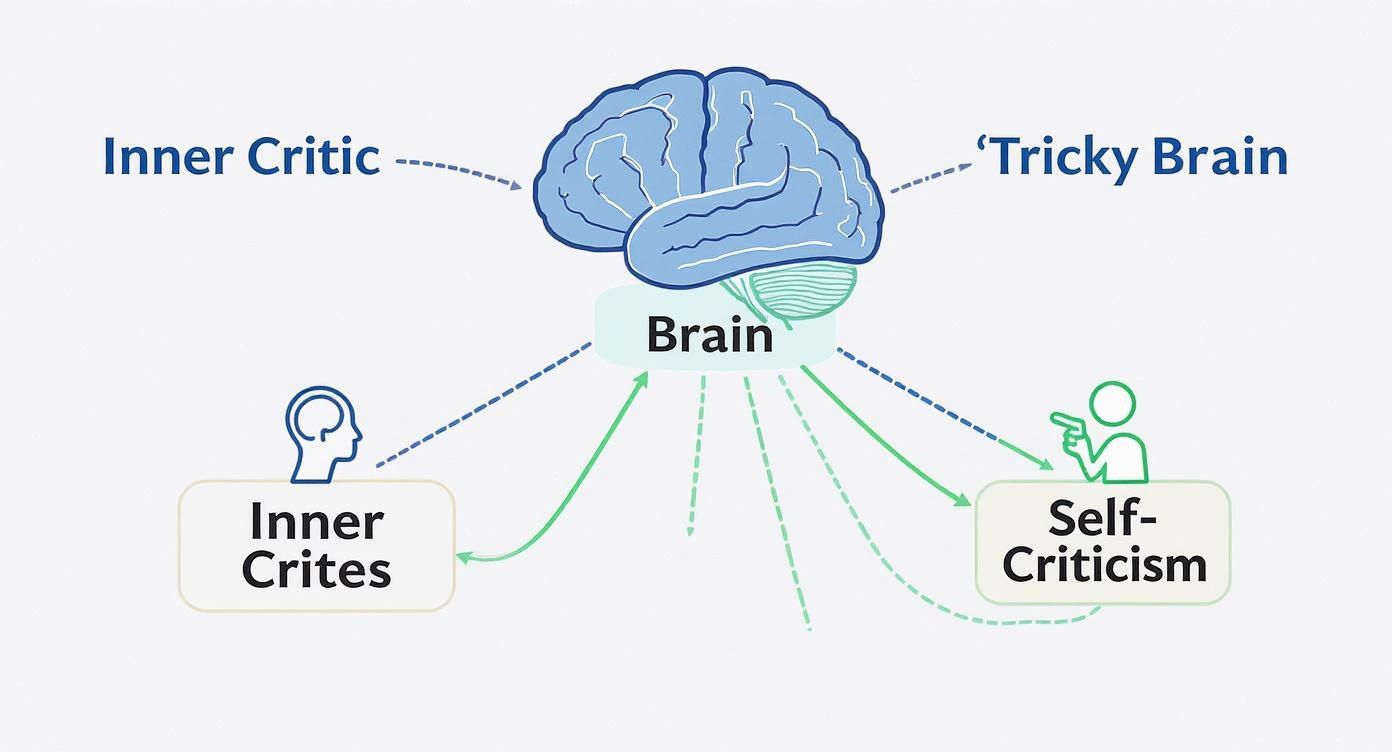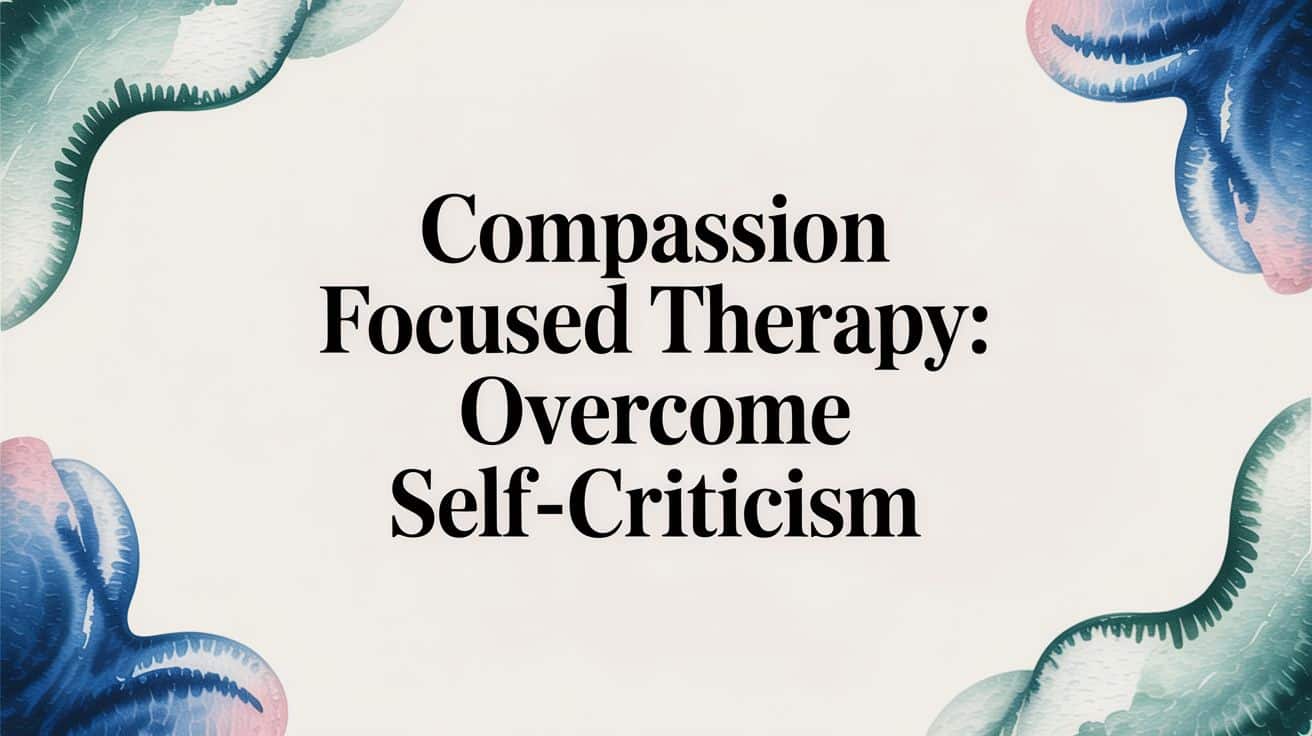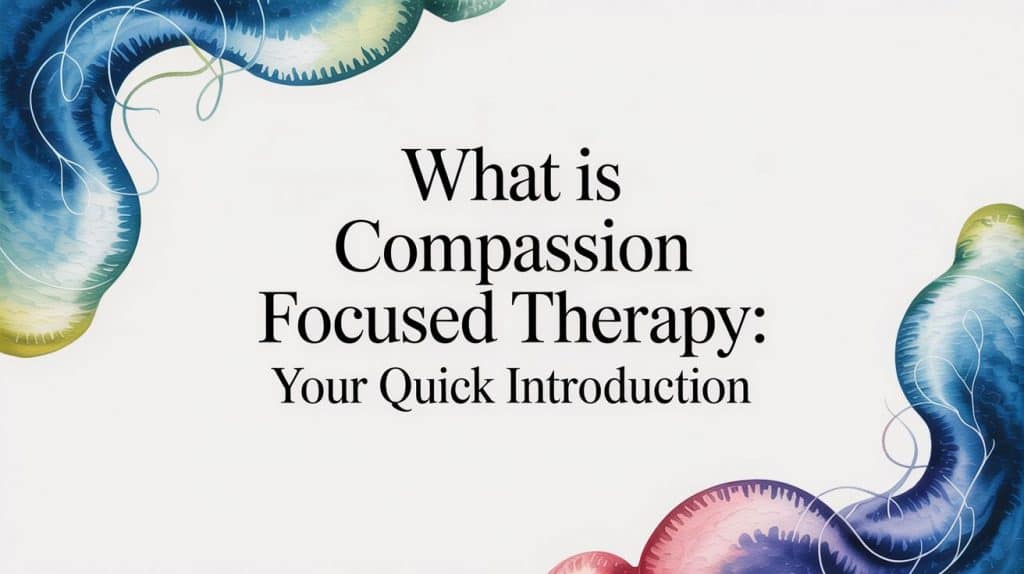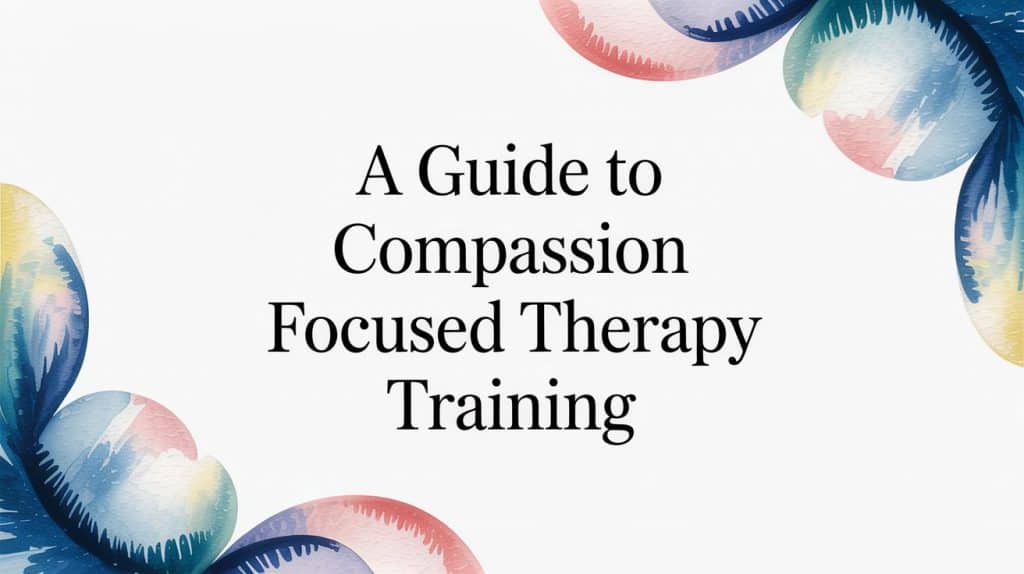Compassion Focused Therapy (or CFT for short) is a powerful, science-backed way of working with people who get tangled up in high levels of shame and self-criticism. It’s built on a beautifully simple yet profound idea: our brains are tricky by design. They’ve been shaped over millions of years of evolution for one primary purpose—survival—not for our constant, 24/7 happiness.
This means that so many of our struggles aren’t a sign of personal failing. Far from it. They’re often the result of our ancient, built-in threat systems simply doing their job a little too well.
What Is Compassion Focused Therapy?
So, what exactly is CFT? Well, it's a therapeutic approach designed to help people cultivate a kinder, more supportive inner world. Developed by Professor Paul Gilbert, it brilliantly weaves together techniques from cognitive behavioural therapy with deep insights from evolutionary psychology, neuroscience, and attachment theory.
The central idea is that many of our most persistent mental health challenges—especially those rooted in shame and self-criticism—come from having an overactive threat system combined with an underdeveloped capacity for self-soothing and reassurance.
Most therapies focus on challenging irrational or unhelpful thoughts. CFT does something different. It works on changing the entire emotional tone of your inner world.
Think of it this way: if your mind is a garden, relentless self-criticism is like scattering weed killer everywhere. CFT doesn't just focus on pulling out the weeds; it teaches you how to cultivate rich, fertile soil—full of kindness, warmth, and support—so that more compassionate ways of thinking and feeling can naturally take root and flourish.
The Goal of CFT
At its heart, the main goal of CFT is to develop what we call a 'Compassionate Mind'. This isn't about slapping on a brave face or forcing yourself to 'think positive'. It’s a much deeper process of building the inner strength, wisdom, and courage to turn towards your suffering with a genuine commitment to help yourself.
It’s about learning to shift from being your own worst critic to becoming your own best ally.
"Our complex mind, while helpful, comes with the innate ability to get in its own way. We have the ability to over-think, under-think, tune in, tune out, distract, avoid, wind ourselves up, and all sorts of other things all at the exact wrong time."
This shift is so crucial because, as we’ve touched on, our brains are hardwired for survival. Our threat systems—responsible for feelings like anxiety, anger, and shame—are ancient, incredibly powerful, and highly effective at keeping us safe from predators. The problem is, in our modern world, these same systems can be easily triggered by a critical comment from a boss, social rejection, or just our own harsh self-judgment, locking us into a state of chronic distress.
Why It Matters in the UK
Here in the United Kingdom, CFT is getting some serious and well-deserved recognition within mental health services, including the NHS. It's proving to be a game-changer for conditions where a harsh inner critic is a major part of the problem.
We're seeing it make a real difference in several key areas:
- Chronic Depression and Anxiety: It helps people break free from the relentless cycles of negative self-talk that pour fuel on the fire of these conditions.
- Complex Trauma: It offers a safe and gentle framework for people to begin processing traumatic memories without being completely overwhelmed by shame and self-blame.
- Eating Disorders: It directly addresses the intense body-related self-criticism and shame that so often keep disordered eating patterns stuck in place.
By helping us understand that our 'tricky brains' are not our fault, CFT offers a path towards healing that feels destigmatising and genuinely empowering. It gives us the practical tools to intentionally strengthen our innate capacity for compassion, leading to far greater emotional balance and resilience in the face of life's inevitable challenges.
Your Brain's Three Emotion Systems
At the very heart of Compassion Focused Therapy (CFT) is a beautifully simple, yet profound, way of looking at our minds. Professor Paul Gilbert, the creator of CFT, proposed that we all have three core emotion regulation systems, each with its own very specific job.
Think of them as different operating modes for your brain, hardwired by evolution over millions of years to help you survive and, hopefully, thrive.
Getting to know these systems is the first real step in understanding why we get so tangled up in cycles of anxiety, relentless striving, or harsh self-criticism. It’s also what shines a light on the path toward finding a more settled, balanced way of being.
The infographic below gives a great visual of how our 'tricky brain'—with its built-in inner critic—often knocks these systems out of balance.

This image helps us see that self-criticism isn’t some personal flaw we need to stamp out. It’s an old, default feature of our evolutionary wiring, and CFT gives us the tools to work with it differently.
The Threat System: Your Internal Smoke Alarm
First up, we have the Threat System. This is the oldest, and often loudest, system in the room. Its one and only job is to sniff out danger and get you ready to respond, keeping you safe from harm.
Picture it as a hyper-sensitive smoke alarm. It’s always on, constantly scanning your world—both inside and out—for anything that might be a problem. When it detects a threat, whether that’s a real physical danger or something more emotional like the fear of being rejected, it hits the panic button. Your body gets flooded with hormones like adrenaline and cortisol, sparking feelings like anxiety, anger, or disgust to prepare you to fight, flee, or freeze.
This system is absolutely vital for survival. The trouble is, in our modern world, the alarm is often triggered by an overflowing inbox, a traffic jam, or even our own critical thoughts, leaving many of us stuck in a state of near-constant high alert.
The Drive System: Your Inner Go-Getter
Next is the Drive System. This is all about motivation, achievement, and going after the things we want and need. It’s the part of you that gets a buzz from chasing a goal, striving for success, or seeking out rewards. Think of it as your inner go-getter.
When your drive system is active, you feel emotions like excitement, anticipation, and pleasure. It’s the engine that pushes you to work towards that promotion, train for a marathon, or build a business. We need this system to get things done and feel a sense of accomplishment. But when it goes into overdrive, it can easily lead to burnout, frustration, and a nagging feeling that you’re never quite doing enough.
The Soothing System: Your Safe Haven
Finally, there’s the Soothing System. This system is all about feelings of calm, safeness, and contentment. It comes online when we feel cared for, connected, and safe—when there are no threats to handle and no goals to strive for. It's a state of peaceful being, rather than doing.
This system fosters feelings of peacefulness and connection. It helps us care for ourselves and others, promoting a sense of inner stability and rest.
For many people, especially those who struggle with a harsh inner critic, this soothing system is often underdeveloped and underused. Our fast-paced culture heaps rewards on the drive system and constantly pokes the threat system, leaving very little time or space for our soothing system to come online and grow. CFT was designed specifically to help us correct this imbalance.
To bring this all together, here’s a quick summary of how these three systems work.
Understanding Your Three Emotion Systems
| Emotion System | Primary Purpose | Associated Feelings | Risk of Overactivation |
|---|---|---|---|
| Threat System | To detect and respond to danger. | Anxiety, anger, fear, disgust. | Chronic stress, anxiety disorders, paranoia. |
| Drive System | To motivate and pursue resources/goals. | Excitement, pleasure, wanting, joy. | Burnout, addiction, frustration, disappointment. |
| Soothing System | To manage distress and promote bonding. | Calm, contentment, safeness, connection. | Can lead to passivity or lack of motivation if over-relied upon. |
Seeing it laid out like this makes it clear how easily we can get stuck. If our threat and drive systems are constantly firing, it's no wonder we feel exhausted and overwhelmed.
This is exactly where CFT steps in. A 2023 meta-analysis of 15 clinical studies in the UK showed just how effective CFT is for conditions fuelled by high self-criticism. The research found that by intentionally training the soothing system, people saw significant jumps in self-compassion and big drops in depression and self-criticism.
Why? Because CFT gives you practical ways to consciously activate your soothing system. This, in turn, helps regulate the threat and drive systems, allowing you to cultivate a genuine sense of inner warmth and safeness. You can discover more about these findings and the integration of CFT in mental health care.
Core Techniques and Exercises in CFT
Getting your head around the theory of Compassion Focused Therapy is one thing, but the real change happens when you start to put it into practice. CFT isn't about just thinking differently; it's about actively carving out new neural pathways through very specific, targeted exercises. We call this whole process Compassionate Mind Training—think of it as a kind of mental fitness programme designed to strengthen your often-underdeveloped Soothing system.
It really is like going to the gym for your mind. Just as you’d lift weights to build physical muscle, these exercises are designed to build your ‘compassion muscle’. Over time, they help you deliberately shift your internal emotional tone from one of threat and self-criticism to one of safeness, warmth, and genuine support.
Let’s get into some of the most powerful techniques we use in CFT.

Cultivating Compassionate Imagery
One of the cornerstones of CFT is compassionate imagery. This is where you use your imagination to create an ideal compassionate figure or even a compassionate version of yourself. The key here is that you're not just picturing someone you already know; you're building a perfect source of compassion from the ground up, one that’s tailored to exactly what you need.
This figure embodies the three core qualities of compassion:
- Wisdom: They have a deep, non-judgemental understanding of the human condition and everything you’ve been through.
- Strength: They possess the courage and resilience to sit with distress—yours and their own—without being overwhelmed.
- Warmth and Commitment: They are genuinely committed to your wellbeing and radiate a deep sense of kindness and care.
By regularly bringing this image to mind, you give your brain a powerful, internally generated signal of safeness. It's a way of providing yourself with the soothing and reassurance that perhaps you never got enough of, which in turn helps to calm down your threat system.
The Power of Compassionate Letter Writing
Another key practice is compassionate letter writing. This exercise involves writing a letter to yourself about something you’re finding difficult, but you write it from the perspective of your compassionate self or your ideal compassionate image.
This isn’t about fluffy positive self-talk. The goal is to express genuine understanding, validation, and encouragement for the struggle you're in.
For example, a letter might include phrases like:
- "I know how much you're struggling with this, and it makes complete sense given everything you've been through."
- "It's not your fault that your tricky brain is reacting this way; it's just trying to protect you."
- "Remember to be kind to yourself through this. What small, supportive step can we take together?"
The act of writing forces you to step out of your default critical mindset and actively inhabit a more compassionate perspective. It helps to externalise that compassionate voice, making it feel more real and accessible when you need it most.
Healing Dialogues Through Chair Work
Perhaps one of the most dynamic and powerful techniques in CFT is chair work. This involves using two or more chairs to represent different parts of yourself—most commonly, your inner critic and your compassionate self. The therapist then helps facilitate a dialogue between these parts, allowing you to explore their functions, feelings, and underlying intentions.
You might sit in one chair and speak as your harsh inner critic, giving voice to its fears and judgements. Then, you physically move to the other chair to respond from your compassionate self, offering understanding and support instead of fighting back.
This process is incredibly powerful for de-shaming the inner critic. We start to see that its intentions are often protective, even if its methods are harsh and unhelpful. It creates a space for your compassionate self to step forward and take a more central, healing role in your inner world.
Within the UK's NHS IAPT programmes, CFT is increasingly used for mood disorders. One study focused on individuals with clinical depression, using a specialised form of chair work to help them personify and work with their conflicting internal emotions. The results showed that this technique significantly boosts self-directed empathy and helps people differentiate their emotions, which is vital for mental health improvement. You can read the full research about this CFT chairwork study for a deeper look.
These exercises aren't quick fixes; they are skills to be built up over time with consistent practice. For those looking to build these skills in a structured way, exploring a dedicated programme like the 8-week Compassionate Mind Training course can provide a clear and supportive path. By engaging in these practices, you're not just managing symptoms—you're fundamentally reshaping your brain for greater resilience and wellbeing.
Who Benefits Most from CFT?
While learning to be kinder to yourself can help just about anyone, compassion focused therapy really comes into its own for people stuck in specific, often painful, emotional loops. It’s not a magic wand for every problem, but if you’re wrestling with certain kinds of struggles, its approach can be life-changing.
Think of it this way: if your mind is dominated by a harsh inner critic, CFT offers a direct route to turning down the volume on that voice and cultivating a more supportive inner ally instead.
This therapy is particularly powerful for those battling persistent feelings of shame and self-criticism. These emotions often sit at the very core of many long-term mental health difficulties, acting like an anchor holding people back. When your own thoughts are constantly triggering your threat system, it creates a relentless state of internal distress.
Ideal Candidates for Compassion Focused Therapy
CFT is often the therapy of choice when a fierce inner critic is the main engine of suffering. This includes people experiencing:
- Chronic Depression and Anxiety: For those trapped in a spiral of negative self-talk and worry, CFT helps shift the underlying emotional tone of their inner world, going deeper than just challenging the thoughts themselves.
- Complex Trauma: It offers a safe and gentle way to process traumatic experiences, especially when self-blame and shame are major roadblocks to healing.
- Eating Disorders: The approach directly takes on the intense, body-related self-criticism and shame that so often fuel disordered eating.
- Low Self-Esteem: By helping you build an inner source of warmth and support, CFT helps you develop a more stable and compassionate sense of your own worth.
The common thread here is an overactive threat system that has turned inward. If you frequently feel inadequate, flawed, or unlovable, and these feelings are driving your distress, CFT was designed specifically for you.
It helps you understand that this isn't some personal failing. It’s a feature of our 'tricky brains' – a survival mechanism gone awry – that can absolutely be retrained with practice. Learning how to develop your capacity for self-compassion is the key to emotional well-being and resilience, and it provides the foundation for lasting change.
When CFT Might Not Be the First Step
It’s also crucial to know when CFT might not be the right place to start. The therapy requires a certain level of stability and safety to be truly effective.
For instance, if someone is in an unsafe living environment, experiencing acute psychosis, or in the middle of a severe substance abuse crisis, the immediate priority has to be establishing safety and stability. Once that foundation is solid, the deeper work of CFT can begin.
Ultimately, the decision is a personal one, but the evidence for its effectiveness is growing stronger all the time. A recent UK review of what service users thought about CFT found that people consistently found the ideas relevant and helpful. They reported real-world benefits like being kinder to themselves and managing their emotions better, showing that people genuinely connect with and stick to the therapy.
You can read the full review on service user experiences with CFT to learn more. This kind of feedback really highlights its value for those who are ready to change their relationship with their inner critic.
How CFT Compares to Other Therapies
To really get a feel for compassion focused therapy, it’s helpful to see how it sits alongside other major approaches. While most therapies are heading towards the same destination—less suffering and a more fulfilling life—they take very different paths to get there.
Let’s put CFT in context by comparing it with two other well-known and respected therapies: Cognitive Behavioural Therapy (CBT) and Acceptance and Commitment Therapy (ACT).
This isn't about deciding which one is "best." It’s about finding the right fit. Each offers a unique and valuable lens for understanding what it means to be human and how to work with the tricky minds we all have.
CFT Versus Cognitive Behavioural Therapy
Cognitive Behavioural Therapy, or CBT, is a cornerstone of therapy in the UK and for good reason. It’s incredibly effective at helping people catch, challenge, and change unhelpful or distorted thinking patterns that drive distress.
A CBT therapist might guide you by asking, "Let's look at that negative thought. Is it 100% true? What’s the evidence for and against it?" The goal is to swap a distorted view for a more balanced and realistic one.
CFT comes at this from a different angle. It's less concerned with whether a thought is factually correct and far more interested in its function and emotional impact.
Instead of debating the thought, a CFT therapist would gently ask, "When that self-critical thought pops up, how does it make you feel? Is it actually helping you right now, or is it just making you feel threatened and small?"
The real difference is in the response. CBT helps you dispute the thought. CFT helps you change your relationship to the thought by responding to it—and yourself—with kindness. The aim is to soothe the threat system that’s producing the self-criticism in the first place, not just to argue with the words it generates.
CFT Versus Acceptance and Commitment Therapy
At first glance, Acceptance and Commitment Therapy (ACT) and CFT look quite similar. Both draw heavily on mindfulness and both encourage us to stop fighting against difficult thoughts and feelings and instead learn to accept their presence.
But the intention behind this is where they diverge.
In ACT, the goal of mindfulness is to help you "unhook" from difficult thoughts (defusion) so you're free to take committed action towards what truly matters to you—your values. It’s all about creating psychological flexibility, helping you build a rich and meaningful life even when pain shows up.
In CFT, mindfulness is used with a very specific purpose: to intentionally cultivate compassion. It’s a tool to consciously activate your soothing-safeness system. The goal isn't just to notice your inner critic without getting tangled up in it; it’s to actively build and strengthen an inner compassionate self that can offer warmth, support, and wisdom when that critic appears. It's a much more targeted approach, aimed at developing a specific internal resource for emotional regulation.
CFT vs CBT vs ACT: A Quick Comparison
To help make these distinctions a bit clearer, here’s a simple table breaking down the core differences in focus and approach.
| Therapeutic Approach | Primary Goal | Core Focus | Example Technique |
|---|---|---|---|
| Compassion Focused Therapy (CFT) | To develop an inner sense of safeness and self-support. | Activating the soothing system to regulate threat. | Compassionate imagery to create an ideal supportive figure. |
| Cognitive Behavioural Therapy (CBT) | To correct irrational or distorted thinking patterns. | Challenging and restructuring unhelpful thoughts. | Thought records to find evidence for and against a belief. |
| Acceptance and Commitment Therapy (ACT) | To live a rich, value-driven life despite pain. | Increasing psychological flexibility through acceptance. | Mindfulness exercises to observe thoughts without attachment. |
Ultimately, each of these therapies offers powerful tools. The best one often depends on what a person is struggling with and what resonates most deeply with them.
Finding a CFT Therapist in the UK
Realising that compassion focused therapy might be the right path for you is a huge first step. The next, of course, is finding a qualified and experienced therapist to walk alongside you. In the UK, you’ve got a couple of clear pathways to find a CFT therapist, whether you go through the NHS or look for someone privately.
Let’s map out how you can find the right support. The connection you have with your therapist is a massive part of the healing process, so making an informed choice is key.

NHS and IAPT Services
For many of us, the first port of call is our GP. It’s a good idea to book an appointment to chat through your mental health concerns and see if a referral for psychological therapy makes sense. CFT is becoming more widely recognised and is often available within NHS mental health trusts and Improving Access to Psychological Therapies (IAPT) services.
Your GP will know what’s available locally and can get the ball rolling on a referral. Yes, waiting lists can sometimes be a factor, but this is a fantastic and accessible way to get evidence-based care.
Searching for a Private Therapist
If you'd rather go private, you get a bit more control over who you see and when your sessions take place. The most important thing here is to make sure any therapist you’re considering is properly accredited with a recognised professional body. This is your guarantee that they meet high standards for training, ethics, and practice.
Here are the key organisations for finding accredited therapists in the UK:
- The British Psychological Society (BPS): The BPS keeps a directory of chartered psychologists, and you’ll find many who have trained in CFT.
- The British Association for Behavioural and Cognitive Psychotherapies (BABCP): This is the main hub for CBT in the UK, and lots of its accredited members are also skilled in third-wave approaches like CFT.
These directories are great because you can search by location and specialism, helping you pinpoint a qualified professional in your area.
For finding practitioners who are specifically trained in CFT, your most direct route is The Compassionate Mind Foundation. It’s the central hub founded by Professor Paul Gilbert himself, and their website often lists therapists who have completed official training in the approach.
Working with a CFT Specialist
When you're searching, it’s always worth looking for people who truly specialise in this work. Experts who dedicate their practice to compassion focused therapy will have a much deeper, nuanced understanding of its principles and techniques. For instance, some clinical psychologists build their entire practice around this specific model.
For those looking for that kind of dedicated one-to-one support, you can learn more about accessing specialised CFT therapy with Dr Chris Irons to see if it feels like the right fit for your needs.
No matter which route you take, don't be shy about asking potential therapists about their training, their experience, and how they specifically approach CFT. Finding someone you feel safe and genuinely comfortable with is absolutely vital as you start this journey toward building a more compassionate mind.
Got Questions About CFT?
As we start to wrap up this guide, you might find a few questions are still bubbling away. That’s perfectly normal. The world of compassion focused therapy is rich and deep, and getting clear on a few common points can really help cement your understanding.
Let's walk through some of the things people often ask to clear up any final uncertainties.
Is CFT Only for Highly Self-Critical People?
This is a brilliant question, and one I hear a lot. While CFT is an absolute game-changer for people wrestling with high levels of shame and a fierce inner critic, its core ideas are helpful for just about everyone.
At its heart, the therapy is about bringing our emotion systems back into balance. Modern life has a knack for pushing our threat and drive systems into overdrive, which often means our soothing system gets neglected and underdeveloped. Learning to consciously cultivate feelings of safeness, warmth, and connection is a powerful way for anyone to build emotional wellbeing and mental resilience, not just those in deep distress.
How Long Does CFT Usually Take?
There’s no one-size-fits-all answer here. The length of therapy really depends on the individual and the complexity of what they’re bringing. Generally, though, it’s seen as a medium to long-term approach.
For some, a block of around 20 sessions might be enough to build a solid foundation of skills and see real, meaningful change. For others working through more deep-seated difficulties, like complex trauma, therapy could go on for a year or more. The focus is always on creating lasting, sustainable change in your inner world, rather than chasing a quick fix.
The journey of CFT is about skill-building, not just symptom reduction. It takes time and consistent practice to strengthen the 'compassion muscle' and fundamentally reshape long-standing neural pathways of self-criticism into new pathways of self-support.
Can I Practise CFT Techniques on My Own?
Absolutely. Many of the core CFT exercises are perfect for practising on your own and can make a genuine difference in your day-to-day life. A few you can safely explore by yourself include:
- Soothing Rhythm Breathing: A simple but incredibly powerful way to calm your nervous system when you feel stressed or anxious.
- Compassionate Imagery: Visualising a safe place or a compassionate colour to generate feelings of calm and security.
- Compassionate Letter Writing: Writing to yourself from a kinder perspective about something you're finding difficult.
That said, for the deeper emotional work—like chair work—it's really best to have a trained CFT therapist by your side. A therapist provides a safe, supportive container to navigate painful emotions and makes sure the techniques are being used in the most helpful way for you. They can guide you through the process and stop you from feeling overwhelmed.
Is CFT Just a Type of Mindfulness?
It's easy to see why people might think this, but no. While CFT certainly uses mindfulness practices, it’s a distinct therapy with a much more specific goal. Mindfulness is the skill of paying attention to the present moment without getting caught up in judgement. It’s a foundational skill.
In CFT, we take that skill of mindful awareness and use it for a very specific purpose: to intentionally cultivate compassion. Mindfulness helps you notice your critical thoughts without getting swept away by them. This creates a bit of space, and in that space, you can then actively choose a compassionate response. Think of mindfulness as the tool, and building a compassionate mind as the job it's being used for.
At Dr Chris Irons, we are dedicated to helping people transform their relationship with themselves through the power of Compassion Focused Therapy. Whether you are seeking therapy for yourself, professional training, or leadership coaching, we provide expert guidance to help you overcome self-criticism and build a more resilient, fulfilling life. Explore how we can support your journey at https://drchrisirons.com.
Article created using Outrank


